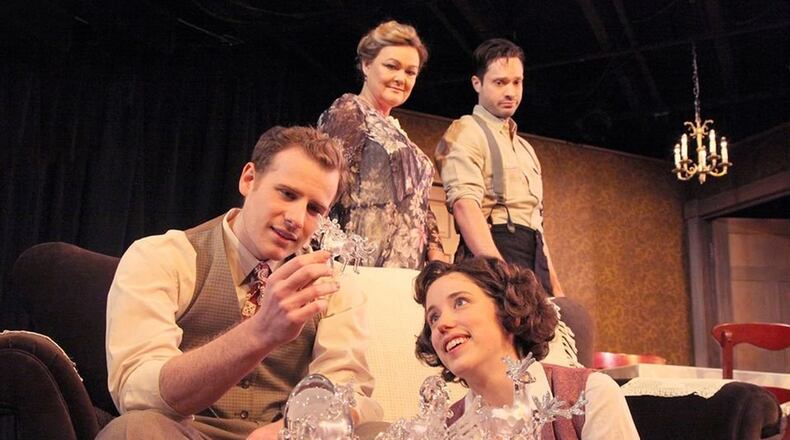One of the biggest challenges about any classic play — whether you’re simply watching it again or actually producing it anew (I presume) — is appreciating the differences or creating unique distinctions between one version and another. This doubtlessly explains why we’ve often seen Shakespeare’s masterpieces, for instance, transplanted into a wide spectrum of times and places, as far removed as you could possibly get from his original Elizabethan England.
Some plays, however, are more timeless that way than others. Take Tennessee Williams’ “The Glass Menagerie.” It’s no less beautifully written now than it was 75 years ago, but it would be hard to imagine the famous drama unfolding anywhere besides its specific setting of St. Louis during the late 1930s.
And it’s no particular reflection on director Topher Payne’s rendition for Dunwoody’s Stage Door Players to wonder if most of us haven’t essentially been here and done this before. It’s a solid, nicely designed production (handsome set by Chuck Welcome, moody lighting by J.D. Williams), with nothing much else to distinguish it, apart from the casting of its four iconic characters.
Some in the ensemble register more effectively than others. Although veteran Shelly McCook may be primarily known as an indomitable comedic actress, she is no stranger to pulling off the occasional dramatic role, too. Here, as Williams’ meddling matriarch, Amanda, she walks a fine line and strikes a delicate balance — alternately flighty and fierce, by turns smothering and alienating her grown children, the restless Tom and the withdrawn Laura.
Relative newcomer Benjamin Strickland, whose previous credits include smaller parts in several musicals, also shines as Jim, the play’s pivotal “gentleman caller,” whom Amanda hopes to ensnare for Laura. The young actor does an admirable job of capturing the character’s former glory as a “paragon of good-natured vitality,” as well as hinting at a few of his subsequent disappointments in life.
As the self-conscious homebody Laura, who walks with a slight limp and basically keeps to herself with a collection of animal figurines, Katie Causey lacks a certain sad timidity for a girl described as “apologetic,” “frightened” and “terribly shy.” Perhaps as directed, a scene in which she’s forced to answer a knock at the door is played for awkward laughs as much as paralyzing fear. Later, when one of her glass ornaments is accidentally broken, she seems barely fazed.
Not always the most subtle actor to begin with, Jonathan Horne’s portrayal of Tom is something of a mixed bag. Directly addressing the audience, he pensively narrates Williams’ so-called “memory play” like the aspiring poet that Tom is. But, in a lot of his interactions with the other characters, it’s as though Horne’s playing a totally separate person, as opposed to an extension of the same man who’s recounting the story for us.
Then again, by Tom’s (and thus Williams’) own admission, “The Glass Menagerie” is a “sentimental” play, not a “realistic” one. It’s about “truth in the pleasant disguise of illusion” — the same as it ever was, and ever will be. Stage Door’s version is probably mainly recommended for those people out there who haven’t already seen it all before.
THEATER REVIEW
“The Glass Menagerie”
Through Feb. 16. 8 p.m. Thursdays-Saturdays; 2:30 p.m. Sundays. $24-$34. North DeKalb Cultural Center, 5339 Chamblee-Dunwoody Rd., Dunwoody. 770-396-1726. stagedoorplayers.net.
Bottom line: So-so.
About the Author
Keep Reading
The Latest
Featured


